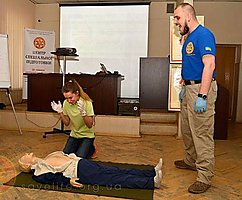As nature resists eternal life and what to do with it
 Bashny.Net
Bashny.Net
Fifty seven million two hundred seventy nine thousand sixty one
© Michael Najjar
Humanity has significantly advanced understanding of the mechanisms of aging. But why nature is not interested in centenarians and how will the world look like if we all live to be a hundred years old? In the magazine The Atlantic published an article about the possibilities of long life. Healthy ageing for many millennia, human life was very short. Rare centenarians were considered God's elect. All the rest at best were able to stretch to 40 years. In XIX century the situation began to change. Since 1840 life expectancy at birth began to grow for about three months every year. In the United States by the early twentieth century it was 47 years, today's newborns are supposed to live to 79. If this continues, by the end of the century life expectancy of Americans will increase to 100 years.
A long life seems to be largely attractive, but entails social risk. An aging electorate will put pressure on political decision-making, achieving greater benefits for themselves that will pay young. But if the increase in life expectancy is simply to add the retired years of helplessness and disease, health care costs can incredibly grow.
But this story may be a happy ending. If science can find a way to slow down the very ageing, last years of life are not only long, but prosperous. Staying healthy and energetic in old age, people will be able to work longer, then the costs of pensions and health care will remain within reasonable limits. One of the most interesting problems of gerontology now is to make the last years of his life fully and not just to delay the final.
What do whales know that we don't know?In search of DNA, can prolong human health, some laboratories have applied for information to the genomes of other mammals. Whales are much rarer than in humans, cancer develops. The diet of polar bears includes a huge amount of fat, but they have no atherosclerotic plaques. Understanding the biological basis of this phenomenon, it is possible to develop a drug that will help people. Imitation of what is already invented in nature, looks more promising than the invention of new DNA sequence.
The worms have the genes daf-2 and daf-16, which can mutate in such a way that animals live twice as long as normal, and perfectly healthy life. It was discovered over 20 years ago Cynthia Kenyon, a molecular biologist from Calico (approx. California Life Company — a company founded to Google for studies of aging). By manipulating those genes in mice, kenion increased life expectancy. These mice were less susceptible to cancer than the control group. The gene daf-16 is similar to the human gene foxo3, a variant of which is associated with longevity. Rumor has it that a drug mimicking this variant of foxo3 is one of the key projects Calico.
Now testing on people closest rapamycin — a drug developed by the Institute of aging research Tank in California. It was originally created as a drug to suppress the rejection of organs during transplantation, but later revealed its impact on cell aging. The mice that were given rapamycin lived longer than the natural life, often until death saving power and energy. If the drug can slow aging in humans, it will be the greatest side effect in the history of pharmaceuticals.
Aging inevitably leads to degenerative changes in particular cells. When the body needs to restore the injured area or stop the development of tumors, adjacent cells give signals that trigger a program of healing damaged cells or death of the failed. In his youth system is working fine. But when cells grow old, they start to send these signals without any reason. The body's ability to heal itself decrease: countless signals reparations cause persistent inflammation, which, in turn, leads to heart disease, Alzheimer's, arthritis and other chronic diseases of old age.
"If we understand how to eliminate degenerating cells or their secrets, we can prevent many illnesses or old age relieve their symptoms," says Judith, Campisi, researcher of the Institute of the Tank in this area. Rapamycin excites the minds of scientists and even of its potential ability to disable signals reparations, by mistake, sent strause cells.
Longevity as directed evoluzioni DNA in each of the cells of a mammal — an exact copy of the DNA of younger and healthier cells, why do we grow old? Felip Sierra, a researcher from the National Institute of aging USA, commented: "Evolution doesn't care about you after the reproductive period. She doesn't need you to have lived longer or died, she just don't care." Mutation, extending the life of the animal, is unlikely to allow him to give more offspring, and therefore is not supported by natural selection. The process of degeneration started after the evolution passes the watch, so the selection is allowed to exist, animals with a defect, which causes aging and death.
In whatever direction or developing the study of aging, we are moving into the unknown — from the point of view of both people and nature. In the animal Kingdom young animals are always so much more than the old one. Humanity is evolving in an opposite scenario, in which society will look very different. Felip Sierra says it this way: "persuading people that death is necessary to delay as far as possible, is not supported by the nature from which we, in any case, move away".
Source: theoryandpractice.ru
© Michael Najjar
Humanity has significantly advanced understanding of the mechanisms of aging. But why nature is not interested in centenarians and how will the world look like if we all live to be a hundred years old? In the magazine The Atlantic published an article about the possibilities of long life. Healthy ageing for many millennia, human life was very short. Rare centenarians were considered God's elect. All the rest at best were able to stretch to 40 years. In XIX century the situation began to change. Since 1840 life expectancy at birth began to grow for about three months every year. In the United States by the early twentieth century it was 47 years, today's newborns are supposed to live to 79. If this continues, by the end of the century life expectancy of Americans will increase to 100 years.
A long life seems to be largely attractive, but entails social risk. An aging electorate will put pressure on political decision-making, achieving greater benefits for themselves that will pay young. But if the increase in life expectancy is simply to add the retired years of helplessness and disease, health care costs can incredibly grow.
But this story may be a happy ending. If science can find a way to slow down the very ageing, last years of life are not only long, but prosperous. Staying healthy and energetic in old age, people will be able to work longer, then the costs of pensions and health care will remain within reasonable limits. One of the most interesting problems of gerontology now is to make the last years of his life fully and not just to delay the final.
What do whales know that we don't know?In search of DNA, can prolong human health, some laboratories have applied for information to the genomes of other mammals. Whales are much rarer than in humans, cancer develops. The diet of polar bears includes a huge amount of fat, but they have no atherosclerotic plaques. Understanding the biological basis of this phenomenon, it is possible to develop a drug that will help people. Imitation of what is already invented in nature, looks more promising than the invention of new DNA sequence.
The worms have the genes daf-2 and daf-16, which can mutate in such a way that animals live twice as long as normal, and perfectly healthy life. It was discovered over 20 years ago Cynthia Kenyon, a molecular biologist from Calico (approx. California Life Company — a company founded to Google for studies of aging). By manipulating those genes in mice, kenion increased life expectancy. These mice were less susceptible to cancer than the control group. The gene daf-16 is similar to the human gene foxo3, a variant of which is associated with longevity. Rumor has it that a drug mimicking this variant of foxo3 is one of the key projects Calico.
Now testing on people closest rapamycin — a drug developed by the Institute of aging research Tank in California. It was originally created as a drug to suppress the rejection of organs during transplantation, but later revealed its impact on cell aging. The mice that were given rapamycin lived longer than the natural life, often until death saving power and energy. If the drug can slow aging in humans, it will be the greatest side effect in the history of pharmaceuticals.
Aging inevitably leads to degenerative changes in particular cells. When the body needs to restore the injured area or stop the development of tumors, adjacent cells give signals that trigger a program of healing damaged cells or death of the failed. In his youth system is working fine. But when cells grow old, they start to send these signals without any reason. The body's ability to heal itself decrease: countless signals reparations cause persistent inflammation, which, in turn, leads to heart disease, Alzheimer's, arthritis and other chronic diseases of old age.
"If we understand how to eliminate degenerating cells or their secrets, we can prevent many illnesses or old age relieve their symptoms," says Judith, Campisi, researcher of the Institute of the Tank in this area. Rapamycin excites the minds of scientists and even of its potential ability to disable signals reparations, by mistake, sent strause cells.
Longevity as directed evoluzioni DNA in each of the cells of a mammal — an exact copy of the DNA of younger and healthier cells, why do we grow old? Felip Sierra, a researcher from the National Institute of aging USA, commented: "Evolution doesn't care about you after the reproductive period. She doesn't need you to have lived longer or died, she just don't care." Mutation, extending the life of the animal, is unlikely to allow him to give more offspring, and therefore is not supported by natural selection. The process of degeneration started after the evolution passes the watch, so the selection is allowed to exist, animals with a defect, which causes aging and death.
In whatever direction or developing the study of aging, we are moving into the unknown — from the point of view of both people and nature. In the animal Kingdom young animals are always so much more than the old one. Humanity is evolving in an opposite scenario, in which society will look very different. Felip Sierra says it this way: "persuading people that death is necessary to delay as far as possible, is not supported by the nature from which we, in any case, move away".
Source: theoryandpractice.ru
Tags
See also
Why employees do stupid mistakes and what to do. Part 2
Where does the passive aggression and what to do
James Glick about how the Internet drives us crazy and what to do with it
Cold Woman - what is the reason and what to do with it
Internal trash and what to do with it
Fake eggs from China: how to do it and how to spot a fake
Why colonize Mars is difficult - and that this should be done
9 most popular Dreams: What They really mean and what to do
"Me, me, me": how ego interferes in the business and what to do with it

















